Thesis Statement
- In the attempt to lay a fundamental mechanism for understanding how gender roles are socially constructed within a society, feminism has created a new interpretation of gender and sex
- Despite the fact that a number of women fight for gender equality, they do not support feminist objectives. Surprisingly, these women fail to consider themselves as feminists. However, they portray male characteristics of superiority (patriarchy) in different aspects of life.
- The position of the paper is that women should not only back up feminist activities, but also accept their positions as women.
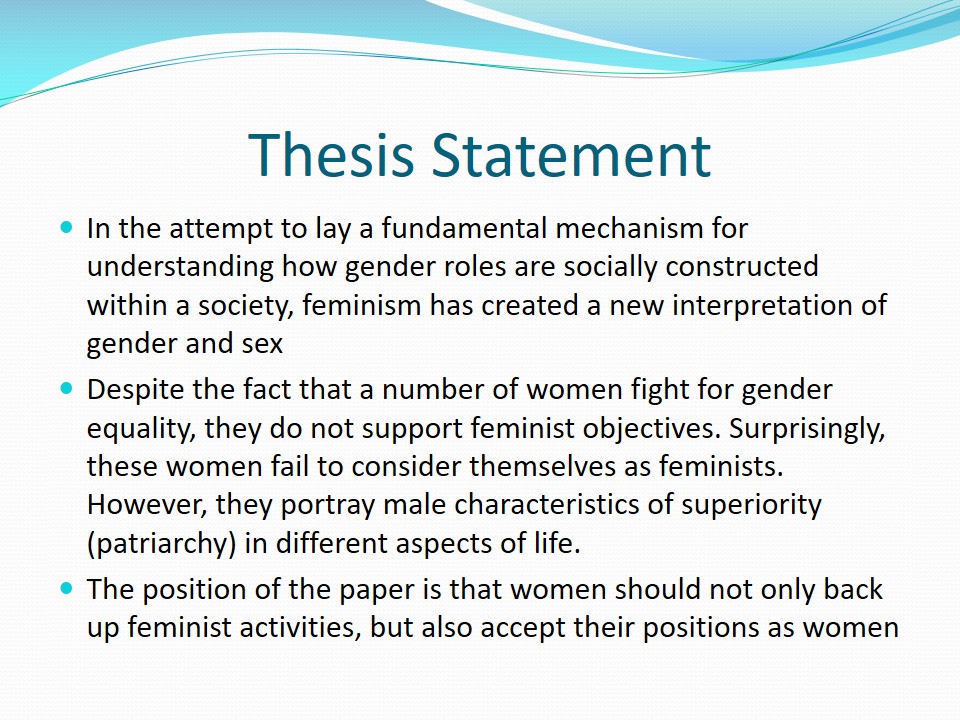
Why my Topic interests Me
- My social background has played a key role towards my choice of the topic for my presentation
- It is a burden for parents to have three daughters in the Indian culture especially when it comes to addressing their reproductive and bodily rights and needs
- For instance, it is a challenge for the Indian parents to cater for dowry expenses of the three girls
- Such girls will not only lack proper education but also be exposed to early marriages.
- Therefore, there is the need for me to develop a set of ideologies aiming at identifying and defending the political, economic, and social rights of women in society.
From my personal experience, I was always fighting for equal rights in the family but never knew the term- Feminism . In fact, I did not know about feminism until I took the class last semester. Therefore, with such a knowledge, I will strive confidently to restore the dignity of women that has been taken away not only in India but also in the world at large. Such an effort will awaken the dreams, voice, and power of many women that could not be witnessed before.
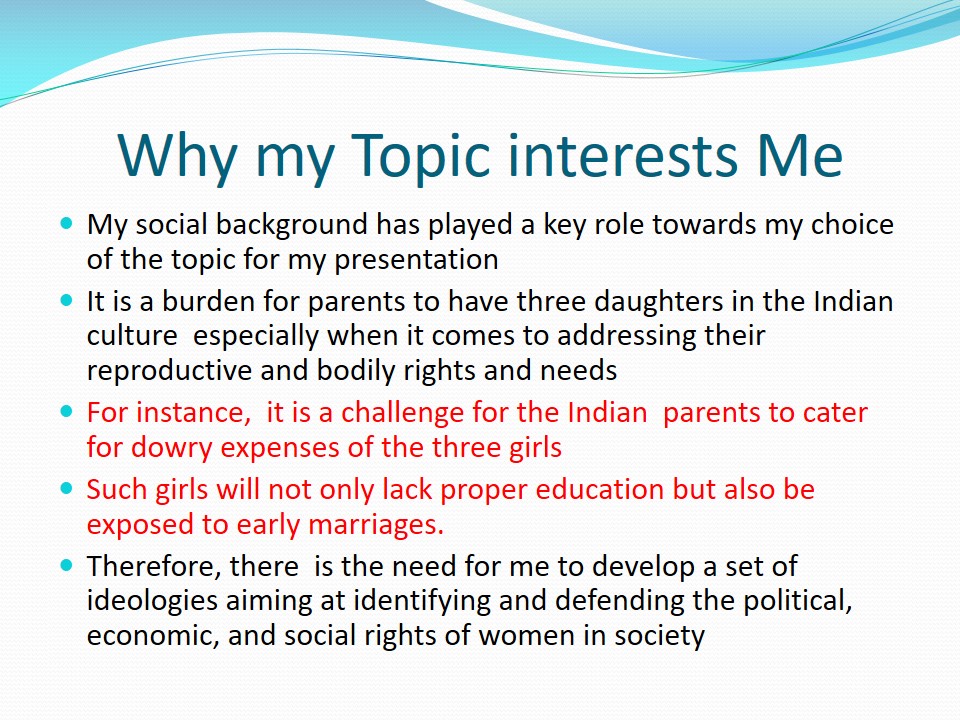
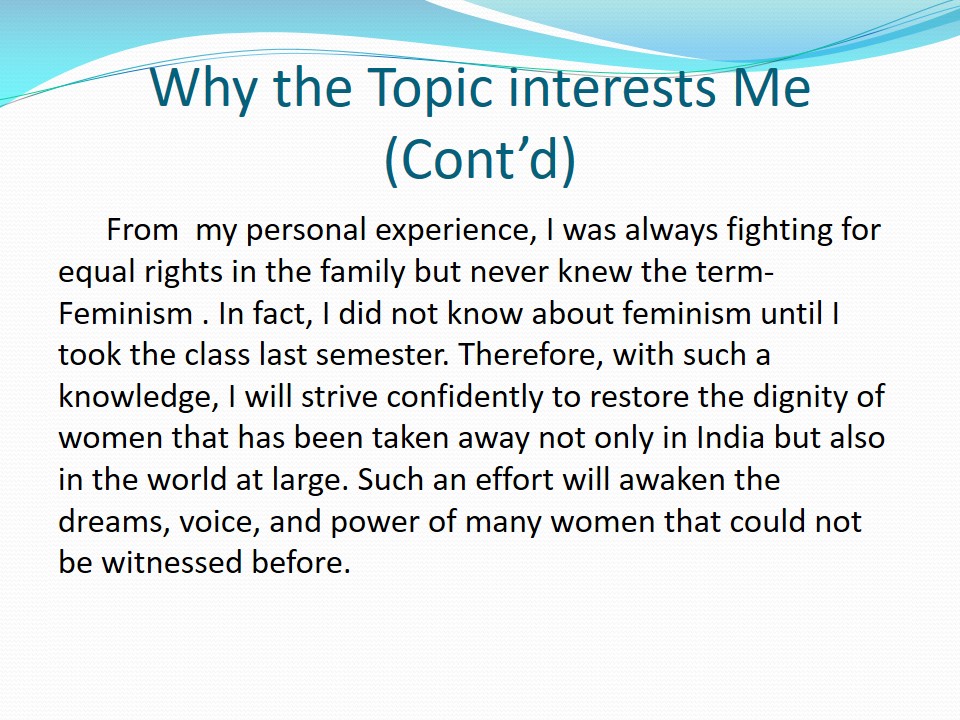
Academic Disciplines used to answer the Research Question
In response to the research question “Historical Development of Feminism and Patriarchy”, I conducted a literature review of the topic using credible sources that addressed specifically the issue of feminism.
I used many studies in various disciplines such as economic, literary critics, anthropology, and women studies without negating sociology.
Such sources have been included in the notes section for confirmation.
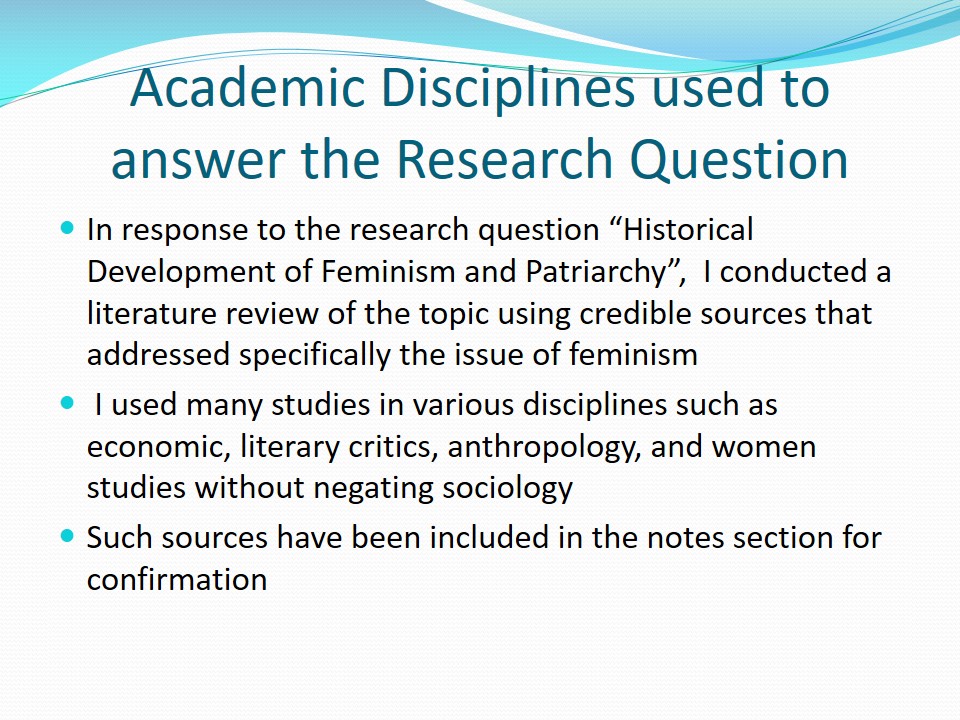
Research Findings
- Many of the issues that affect the lives of women attract some ethical and moral concerns from various people.
- According to feminists, the failure to give women the rights to determine whether they want to carry on with their pregnancies or not amounts to denial of fundamental human rights for autonomy in control of one’s productive health and even to control one’s body.
- Women in the United States have always encountered challenges that interfere with their individual fulfillment in society.
- For instance, some have risen up to fight for their rights, but they hardly identify themselves as feminists due to the stigma associated with the term.
- They cannot fight for their own rights by themselves without interventions of various women movements such as the Women’s Liberation Movement (WLM).
- Through constitutional development, women have managed to advocate for the ratification of laws that protect them from inhumane conditions such as rape, violence and subjugation to the domain of the home.
- Therefore, as argued by scholars who subscribe to feminist school of thought, women should be given reproductive rights such as using contraceptives and procurement of an abortion at will.
- A larger extension of this argument is that women should also have the ability to say when, how, and with whom they have sexual intercourse.
- Before the advent of feminism, the living conditions of women were very poor since they were perpetually pushed to the periphery, even on matters touching their own health.
- Women existed to be seen, but not to be heard, since they were the properties of men.
- Therefore, any women should be protected from practices that would interfere with reproduction such as gender-based violence, forced sterilization, and female genital mutilation.
- There is the need to develop various theories explaining the manner in which women can deal with the challenges associated with negative gender profiling such as gender discrimination.
- Conclusively, women bear the mindset and not the identity, which seems to be self-interested.
- The negative depiction of feminism and feminists has made many women believe in equality.
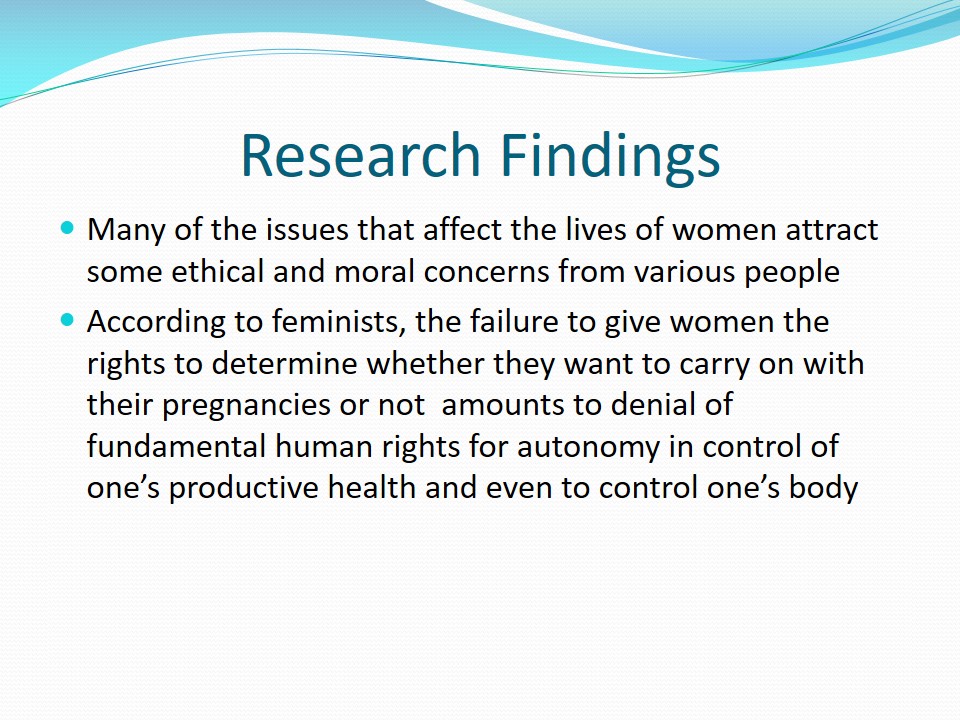
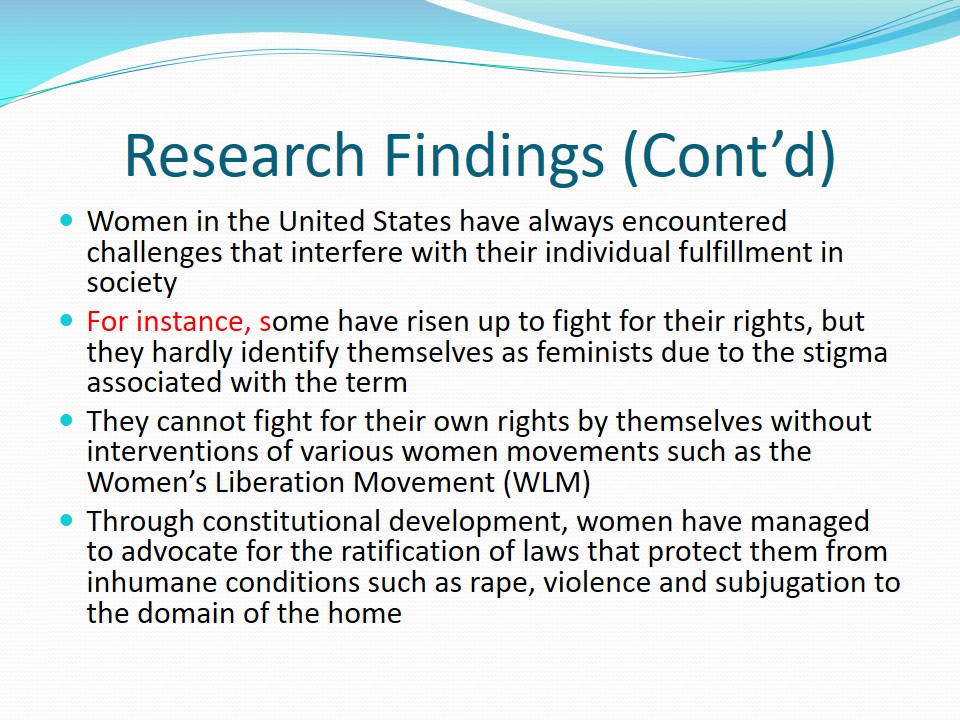
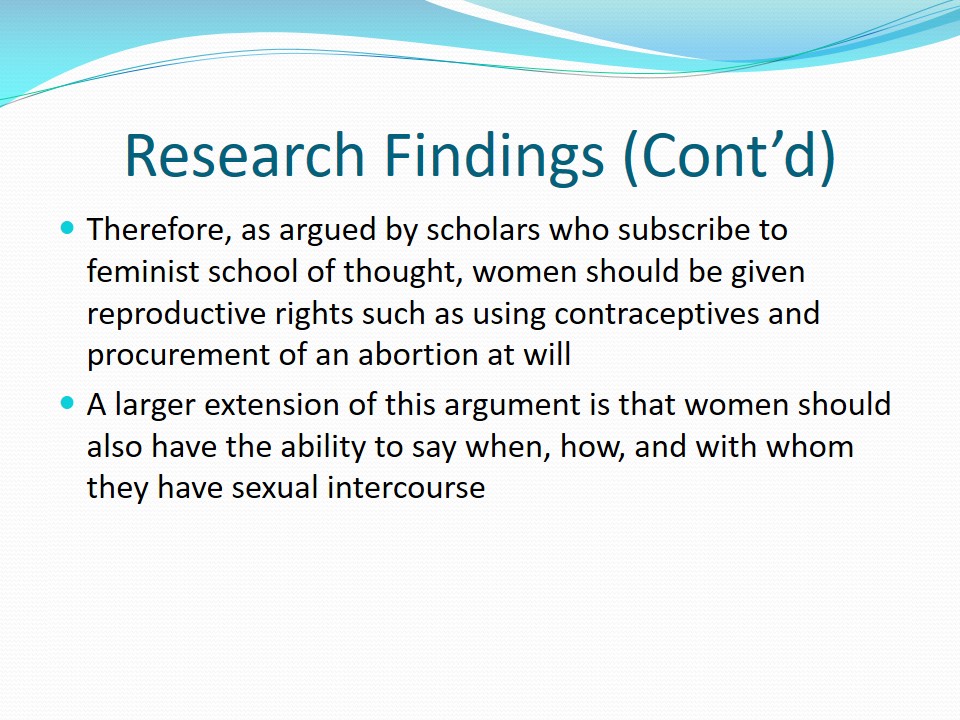
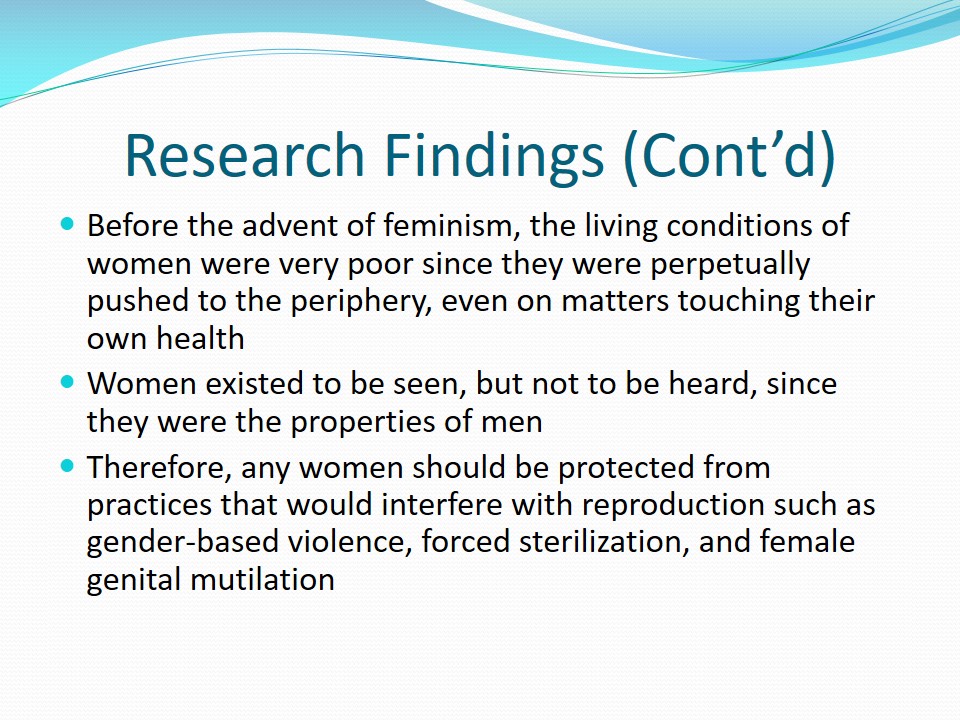
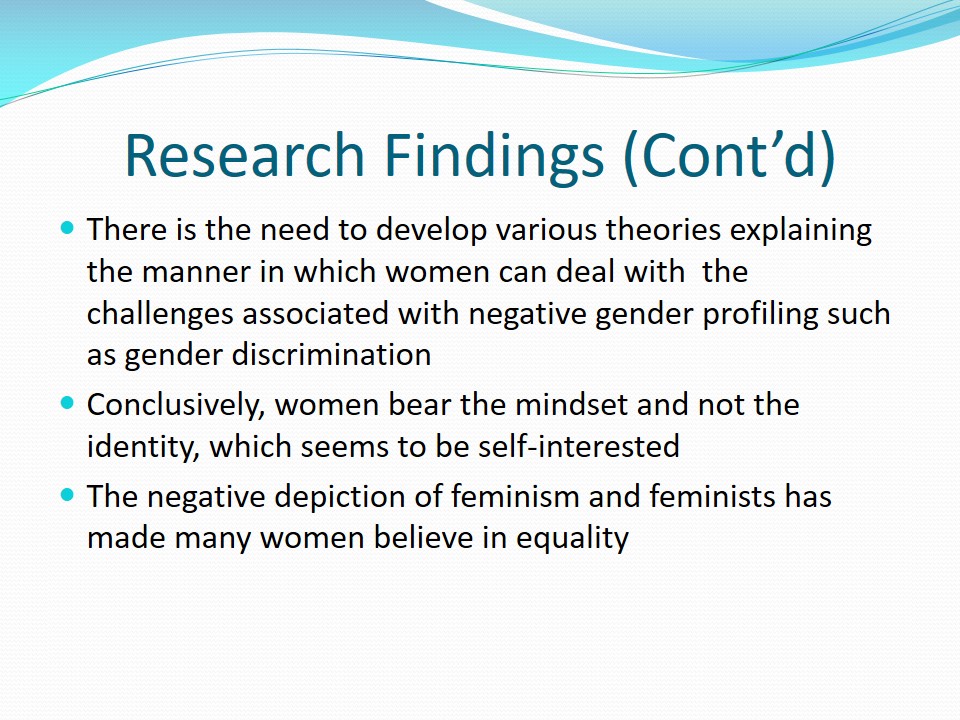
References
Center for American Women and Politics. (2012). Women of Color in Elective Office. New Brunswick, NJ: Center for American Women and Politics.
Cole, R., & Sabik, J. (2010). Associations between femininity and women’s political behavior during midlife. Psychology of Women Quarterly, 34(4), 508-520.
Duncan, E. (2010). Women’s relationship to feminism: effects of generation and feminist self‐labeling. Psychology of Women Quarterly, 34(4), 498-507.
Gwyn, K., & Margo, O. (n.d). Women’s Lives: Multicultural Perspective. London: Routledge.
Hennessy, R., & Ingraham, C. (1997). Materialist feminism: a reader in class, difference, and women’s lives. London: Routledge.
Holland, J., & Cortina, M. (2013). When sexism and feminism collide the sexual harassment of feminist working women. Psychology of Women Quarterly, 37(2), 192-208.
Hooks, B. (2000). Feminism is for everybody: Passionate politics. Brooklyn, NY: South End Press.
MacKinnon, C. (2007). Feminism Unmodified: Discourses on Life and Law. Cambridge, MA: Harvard University Press.
McCabe, J. (2005). What’s in a label? The relationship between feminist self-identification and “feminist” attitudes among US women and men. Gender & Society, 19(4), 480-505.
Moradi, B., Martin, A., & Brewster, M. (2012). Disarming the threat to feminist identification: an application of personal construct theory to measurement and intervention. Psychology of Women Quarterly, 36(2), 197-209.
Penny, F., & Nicola, F. (2001). Differential aesthetics: art practices, philosophy and feminist understandings. Aldershot, Hants, England: Ashgate.
Ramsey, R., Haines, E., Hurt, M., Nelson, A., Turner, L., Liss, M., & Erchull, J. (2007). Thinking of others: Feminist identification and the perception of others’ beliefs. Sex Roles, 56(10), 611-616.
Ray, S. (2003). Against Earnestness: The Place in Performance in Feminist Theory. Studies in Practical Philosophy, 3(1), 22-79.
Showalter, E. (1999). Towards a Feminist Poetics. New York: Croom Helm. pp. 25–36.
Snyder-Hall, C. (2010). Third-wave feminism and the defense of “choice”. Perspectives on Politics, 8(1), 255-261.
Wendy, S. (2010). African American Women and Electoral Politics: A Challenge to the Post-Race Rhetoric of the Obama Moment. New York: Cambridge University Press.
Yoder, D., Tobias, A., & Snell, F. (2011). When declaring “I am a feminist” matters: Labeling is linked to activism. Sex Roles, 64(2), 9-18.
Zucker, N., & Bay‐Cheng, Y. (2010). Minding the Gap Between Feminist Identity and Attitudes: The Behavioral and Ideological Divide Between Feminists and Non‐Labelers. Journal of personality, 78(6), 1895-1924.